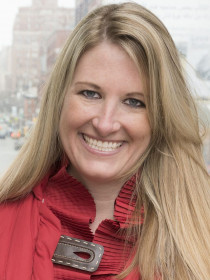Connect with Molly
About Molly
Makris's research focuses on urban education policy, charter schools, public housing, and gentrification. Overarching themes in Makris's writing include educational and housing inequality and segregation.
Contributions
Focus on Students Not Standardized Testing
In the News
Publications
Examines how New York City activists conceptualized educational equity during the pandemic. Integration activists emphasized school integration for democratic equality; and meritocratic activists prioritized retaining the existing stratified system mainly to foster social mobility and social efficiency.
Tells an important and nuanced tale of gentrification using an intersectional lens to examine the history of race relations, the too often overlooked history of the postindustrial city, the role of the LGBTQ population, barriers to employment and access to amenities, and the role of developers as the city rapidly changes.
Explores an interdisciplinary approach to urban education policy to examine the formal education and physical environment of young people from low-income backgrounds and demonstrate how gentrification shapes these circumstances. This is a case study of Hoboken, NJ.
Describes the intersection of public and private interests in the context of education in a gentrified urban area. This empirical example demonstrates the ongoing neoliberalization of public education and the ways in which public subsidies and institutions (such as charter schools) can support private developers in shaping the increasing educational opportunity divide between socioeconomically advantaged and disadvantaged residents.
This empirical study of privately owned public spaces in Manhattan centers the voices
and experiences of young men of color. The article offers an expansion upon the
conclusions of other researchers and argues that the story of corporate public space, race,
exclusion, and research into them is more complex than existing literature reveals.
Seeks to elucidate a specific type of charter school. Distinct from many of their counterparts, prestige charter schools have the following two features: elements which foster a reputation similar to that of elite private schools and a student population demographically distinct from local public district schools – whereby the prestige charters serve a disproportionate number of advantaged families. The prestige elements include: founding by advantaged community members; parental involvement; wait lists; popularity with advantaged professionals; high test scores; and niche themes.
Investigates school choice in a gentrified urban context and examines the ways in which school choice as rhetoric creates false perceptions, how school-choice policies can betray the very principle they espouse, and how choice (while sought after by many) can undermine community.
